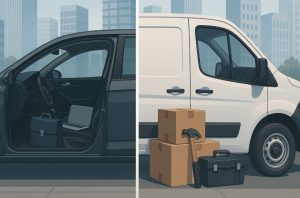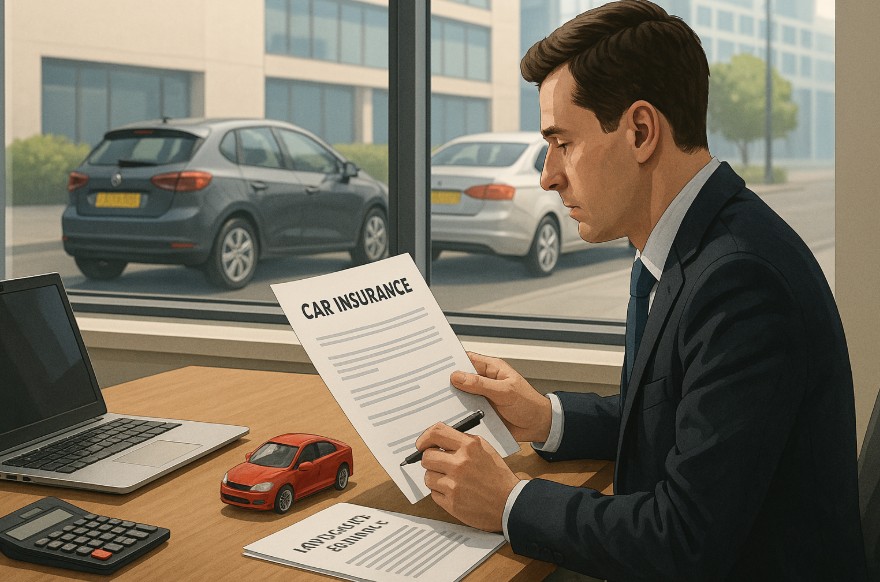When using your vehicle for more than just commuting, it’s essential to understand the importance of business car insurance. In the UK, standard policies typically exclude work-related driving such as visiting clients or travelling to multiple job sites.
Without the correct cover, you could risk invalidating your insurance and facing legal consequences. This guide explains how much it costs to add business use to your car insurance, the different types of cover available, and how to get the best value
What Is Business Car Insurance and Why Might You Need It?

Business car insurance is necessary when a driver uses their vehicle for tasks related to their job that go beyond the daily commute. A standard car insurance policy typically only covers social, domestic, and pleasure purposes, including commuting to a fixed place of work.
However, if the vehicle is used for client visits, travelling to multiple job sites, attending off-site meetings, or running work-related errands, a business car insurance policy becomes a legal and practical requirement.
Drivers without appropriate cover for business use may find themselves personally liable in the event of a claim, and insurers may refuse to pay out.
Additionally, knowingly using a personal policy for business use can be considered insurance fraud, which may lead to prosecution, cancellation of the policy, and difficulty obtaining insurance in the future.
Business car insurance is not just for self-employed workers or business owners. Employees who use their own vehicles during the working day for any reason other than commuting also need to ensure they are adequately insured.
What Are the Different Classes of Business Car Insurance in the UK?
Business car insurance in the UK is divided into three main classes. The class you need depends on how frequently you drive for work and the nature of your trips.
Class 1
Class 1 is the most basic form of business car insurance. It allows drivers to use their vehicles for infrequent or occasional business-related journeys. This can include visiting customers or driving between different work locations. It typically excludes deliveries or regular travel to different sites.
Common use cases for Class 1:
- Employees attending training courses
- Visiting clients on an ad hoc basis
- Travelling to different office branches
Class 2
Class 2 includes everything covered under Class 1 but also permits the inclusion of one or more named drivers on the same policy. This is suitable for businesses where multiple employees share a single vehicle.
Insurers generally require that the additional named driver works for the same company. This class remains inappropriate for professions where driving is a primary activity, such as courier services.
Suitable for:
- Companies with shared-use cars
- Staff who rotate client visits or job site inspections
Class 3
Class 3 business car insurance is also known as commercial travelling. It is intended for individuals who drive extensively as part of their profession. This includes travelling long distances or covering high mileage regularly. Although it covers visits to clients and prospects, it does not include carrying goods for hire or reward.
Typical users include:
- Field sales representatives
- Regional account managers
- Consultants working across multiple locations
Business Use Insurance Comparison Table
| Insurance Class | Coverage Scope | Includes Named Drivers | High Mileage Suitable | Excludes |
| Class 1 | Limited business travel | No | No | Deliveries, regular site visits |
| Class 2 | Shared company vehicle usage | Yes | No | Delivery services |
| Class 3 | Frequent, long-distance business use | Sometimes (varies) | Yes | Commercial deliveries, taxis |
How Is Business Car Insurance Different from Commercial Vehicle Insurance?

Business car insurance is appropriate for professionals who drive occasionally or regularly for work but do not rely on driving as their main income-generating activity. For example, a project manager who visits several client sites in a personal car would need business use cover.
Commercial vehicle insurance is designed for those who use their vehicle as a fundamental part of their business. This includes delivery drivers, tradespeople who transport tools and materials, taxi drivers, and mobile services such as dog groomers or caterers.
Business vs Commercial Insurance Comparison
| Feature | Business Car Insurance | Commercial Vehicle Insurance |
| Intended Users | Office workers, consultants | Delivery drivers, taxi drivers |
| Covered Activities | Client meetings, site visits | Product delivery, passenger services |
| Types of Vehicles Covered | Private cars | Vans, lorries, company fleets |
| Primary Use | Supporting business operations | Core to business operations |
| Personal Use Included | Yes | Often no, or limited |
What Does Business Car Insurance Typically Cover?
A business car insurance policy can vary by provider but generally includes cover for a broad range of business-related activities, as well as personal use. This dual-purpose coverage ensures that a driver remains protected whether they are running errands on behalf of their employer or using the car on the weekend.
Typical activities covered:
- Driving to meetings or events off-site
- Travelling between different office locations
- Visiting clients or job sites
- Transporting tools, equipment, or samples (if permitted under the class)
- Running business-related errands, such as banking or collecting supplies
Some insurers also allow you to customise the policy with additional features depending on the nature of your work and the value of the equipment or goods being transported.
How Much Does It Cost to Add Business Use to Car Insurance in the UK?
Adding business use to a car insurance policy in the UK typically costs between £25 and £100 annually, but this can vary based on the policy class, vehicle type, and personal details.
Factors Influencing Cost
- Vehicle make, model, and insurance group
- Estimated annual mileage for business and personal use
- Driver’s age and experience
- Location and work-related driving routes
- Type of business use (e.g., Class 1 vs Class 3)
Here is a comparison of typical additional costs:
| Business Use Class | Estimated Annual Cost (Additional) | Suitable For |
| Class 1 | £25–£50 | Low-mileage work-related driving |
| Class 2 | £40–£70 | Multiple drivers within a business |
| Class 3 | £60–£100+ | High-mileage roles like sales |
What Isn’t Covered by Business Car Insurance Policies?
Despite its flexibility, business car insurance does not extend to all professional driving activities. It is essential to understand the limitations of this cover to avoid invalidating your policy.
Activities typically not covered:
- Regular delivery of parcels, food, or goods for payment
- Taxi or private hire work
- Courier services
- Driving instruction or chauffeur services
To cover these activities, you will need to seek a specialist policy such as:
- Hire and reward insurance for couriers and food delivery drivers
- Taxi insurance for private hire or hackney carriage drivers
- Commercial motor insurance for tradespeople and fleets
Failing to declare these uses can lead to a rejected claim or cancellation of the policy.
What Optional Extras Can You Add to a Business Car Insurance Policy?

Many business users require additional protection due to the increased risks associated with work-related driving. Insurers provide a variety of optional add-ons to enhance the scope of coverage. These extras can be particularly useful if your vehicle is critical to your job function.
Common optional extras include:
- Motor Legal Protection: Covers legal expenses for uninsured loss recovery or defence in the event of a dispute.
- Courtesy Car Cover: Offers a temporary vehicle if yours is under repair after an insured event.
- Driving Abroad Cover: Required if you intend to take your vehicle to EU countries.
- Breakdown Cover: Ensures you’re not stranded during a work trip.
- Personal Accident Cover: Provides compensation in the event of serious injury or death resulting from an accident.
Selecting only the relevant extras is advised, as these add-ons can significantly affect the premium.
Who Is Responsible for Paying for Business Car Insurance?
Who pays for business car insurance largely depends on whether the vehicle is personally owned or issued by an employer.
Employer-provided Vehicles
If the vehicle is company-owned, the business usually pays for insurance, including business use. Any personal use of the company car may trigger a benefit-in-kind tax liability for the employee.
Personally-owned Vehicles
Employees using their personal cars for business must inform their insurer and upgrade their cover. Some employers reimburse the additional cost or offer mileage allowances, but it remains the employee’s responsibility to have the correct insurance.
Self-employed Professionals
Self-employed individuals must arrange and fund their own business car insurance. Fortunately, HMRC permits the policy cost as a deductible business expense, reducing taxable income. It is important to maintain records of business mileage and differentiate it from personal use for accurate tax reporting.
How Can You Get Cheaper Business Car Insurance?
Business car insurance tends to be more expensive than standard car insurance due to the increased risk associated with work-related driving.
However, there are several legitimate strategies drivers and businesses can implement to reduce premiums without compromising on essential cover. Below are the most effective ways to cut costs, divided into practical subsections.
Choose a Vehicle in a Lower Insurance Group
Insurance providers categorise vehicles into insurance groups ranging from 1 to 50. Cars in lower insurance groups are generally cheaper to insure because they are:
- Less powerful and less likely to be involved in high-speed accidents
- Less costly to repair or replace
- Equipped with better safety features
When choosing a vehicle for business purposes, consider one that falls into a lower group, such as a small hatchback or a hybrid. This can make a noticeable difference in the premium, especially if business mileage is high.
Increase Your Voluntary Excess (With Caution)
Voluntary excess is the amount you agree to pay towards a claim before the insurer contributes. Increasing your voluntary excess can reduce your premium, as it shows the insurer you’re prepared to share more of the financial risk.
Important consideration: Only raise your excess to a level you’re confident you can afford in the event of a claim. Balancing affordability and savings is key.
Pay Annually Instead of Monthly
Many insurers offer a discount if you pay the full annual premium upfront instead of opting for monthly instalments. Monthly payments often include added interest or finance charges, which can increase the overall cost of the policy by 10% or more.
If your cash flow allows, paying annually is a straightforward way to reduce overall spending on business car insurance.
Use a Telematics (Black Box) Policy
Telematics policies monitor your driving habits through a device installed in your car or an app on your phone. These policies assess factors such as:
- Speed
- Braking patterns
- Time of day you drive
- Overall driving behaviour
If the data shows that you’re a safe and responsible driver, your insurer may reduce your premium over time. Telematics can be particularly beneficial for younger drivers or those with limited driving history, who usually face higher premiums.
Build and Protect Your No-Claims Discount
A no-claims discount (NCD) rewards drivers who haven’t made a claim over a certain number of years. Protecting this discount can lead to substantial long-term savings, even if you make a claim later.
Many insurers allow you to protect your NCD for an additional fee, meaning your discount remains intact even after one or more claims, depending on the policy terms.
Tips to build your NCD:
- Drive carefully and avoid unnecessary risks
- Only make claims when essential; consider paying for minor repairs out-of-pocket
- Ensure continuous insurance coverage with no gaps
Improve Your Vehicle’s Security
Enhancing your car’s security can significantly reduce the risk of theft, and insurers often reflect this in lower premiums. Consider:
- Installing an approved alarm or immobiliser
- Using a steering wheel lock
- Fitting a GPS tracker
- Parking in a locked garage or secured area overnight
Even small improvements in security can deter theft and qualify you for insurance discounts.
Limit Your Annual Mileage
The more miles you drive, especially for business, the higher your risk of being involved in an accident. Insurers take mileage into account when setting premiums. If you can accurately estimate and limit your business mileage, you may be eligible for a lower rate.
Practical ways to reduce mileage:
- Combine meetings or visits into one journey
- Use video conferencing instead of travelling
- Share rides with colleagues when appropriate
Make sure not to underestimate your mileage when getting a quote, as underreporting can invalidate your policy.
Compare Quotes From Multiple Insurers
Different insurers use different criteria to calculate risk and premiums, which means prices can vary significantly between providers. Using a comparison website allows you to view multiple offers side-by-side and choose the best deal for your needs.
Some insurers also offer specialist business car insurance that includes benefits tailored to professionals, such as policy flexibility or quick claim turnaround.
When comparing, ensure the quotes include equivalent cover levels and extras to make a fair assessment.
What Information Do You Need to Get a Business Car Insurance Quote?

To receive an accurate quote for business use car insurance, insurers will request several pieces of information:
-
Vehicle details such as registration number, make, model, and age
-
Intended annual mileage for both business and personal use
-
Occupation and nature of the business use
-
Full driving history, including convictions and claims
-
Any named drivers to be included on the policy
-
Current no-claims discount (NCD) status
Providing precise information helps prevent underinsurance and ensures the policy is tailored to your specific business needs. Using comparison platforms can simplify this process and help you find the most competitive rate.
Conclusion
For individuals using their vehicle for anything beyond commuting, business car insurance is not only essential it’s legally required. The additional cost is relatively small compared to the financial and legal consequences of not having proper cover.
Whether you’re a salaried employee, a contractor, or self-employed, having the right policy protects both your professional and personal interests.
Frequently Asked Questions
How do I know if I need business use on my car insurance?
You’ll need it if your job requires you to drive for more than just commuting, such as visiting clients, attending meetings, or transporting equipment.
Can I add business use temporarily for a one-off trip?
Some insurers allow temporary upgrades, but not all. Check with your provider for short-term business use options.
Does business car insurance cover personal use?
Yes, all business car insurance classes include cover for social, domestic, and commuting purposes in addition to business use.
Will adding business use affect my no-claims bonus?
Your no-claims bonus remains intact as long as you don’t make a claim. The type of use does not directly impact your discount.
Is business use car insurance tax-deductible for the self-employed?
Yes, if you’re self-employed, the cost of business car insurance can usually be deducted as a business expense.
How long does it take to add business use to a policy?
Adding business use can be immediate if your insurer allows policy changes online or over the phone.
Do I need special insurance if I use my car to carry tools?
Yes, especially if tools are essential for your business. You may need business cover and separate tool insurance.








